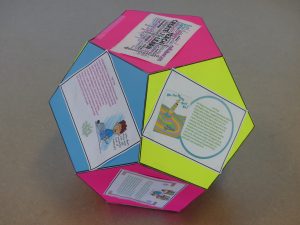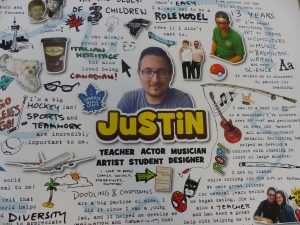A unique visual ‘mapping’ assignment for Faculty of Education teacher candidates provided a deeper understanding and perspective of how they can use their own personal experiences to imagine the possibilities of place-based learning in their future classroom practice.
S tudents in the Faculty’s Arts and Social Studies: Integrating Curriculum in the Primary/Junior division course were tasked with making connections between mapping concepts in the social studies curriculum with their own identity and personal experiences with teaching, learning and schooling in a visual way.
tudents in the Faculty’s Arts and Social Studies: Integrating Curriculum in the Primary/Junior division course were tasked with making connections between mapping concepts in the social studies curriculum with their own identity and personal experiences with teaching, learning and schooling in a visual way.
"By situating themselves within their own schooling experiences through aspects of their own identities, teacher candidates gain a better perspective of how students’ home life and communities can impact their learning and in turn the learning of their future students," said Course Director Heather Bourrie.
"The assignment, which included a written reflection on their personal learning journey and the way that they felt when included or excluded from various communities, was meant to prompt the students to think critically about the ways in which ‘life events’ and community experiences impacted their learning and helped to shape them into being responsible citizens of the global community."
 Students used a variety of methods including drawing, painting, photography, text and media to create their maps. They also consulted the Citizen Education Framework on page 10 of the Ontario Social Studies Curriculum document to help in the creative process of thinking about the ways in which their identity, experiences and environment could inform how they mapped themselves, their community and their learning.
Students used a variety of methods including drawing, painting, photography, text and media to create their maps. They also consulted the Citizen Education Framework on page 10 of the Ontario Social Studies Curriculum document to help in the creative process of thinking about the ways in which their identity, experiences and environment could inform how they mapped themselves, their community and their learning.
"The assignment forced me to reflect back on being a student going through the system, and to now look at it from the perspective of being a teacher," said teacher candidate Kameni. "It forced me to dig deep in order to better understand how my environment and sense of place helped to shape my own identity and to think about how I can use this exercise in my future teaching practice to better understand my students."
"Getting to know your students through their personal experiences and knowing where they come from can provide you with an awareness of what your students know and don’t know and can help you to adapt your teaching style," said teacher candidate Justin Marangoni.
The overall goal of the assignment was to get teacher candidates to think about the concept of citizenship education in the social studies, history and geography curriculum and the ways in which their own schooling and connections to communities has played a role in preparing them to be active citizens in a global community.
